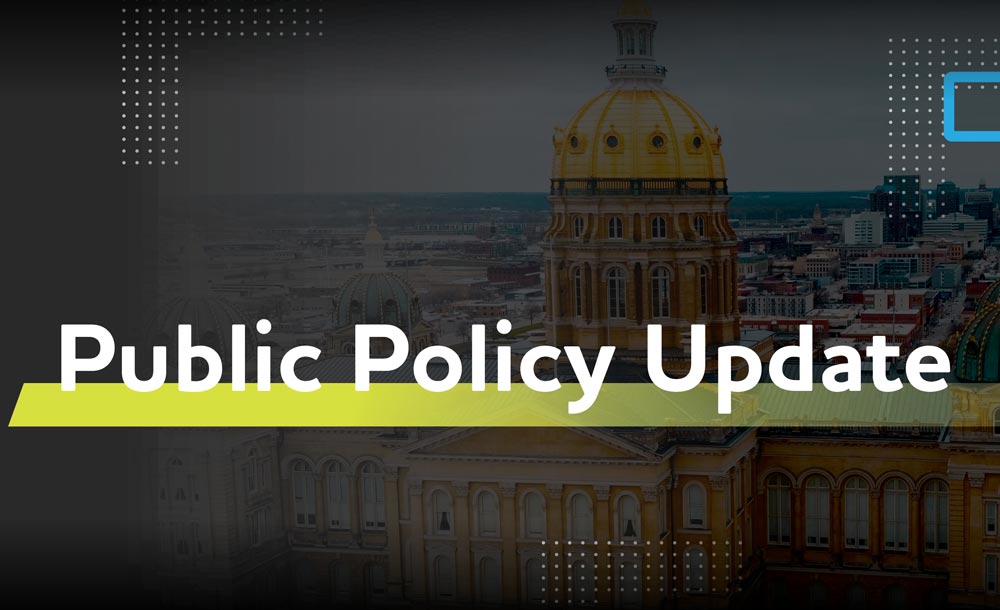
Public Policy Update: Legislative Session Comes to an End
May 5, 2023 | Public Policy

State Policy Update
The Iowa Legislature adjourned Thursday, six days after their per diems ran out. The final week brought property tax reform, budget bills and the remaining policy bills. The governor has 30 days to sign or veto bills once they are sent to her, and additionally can veto line-item budget bills.
Highlights from the budget bills that align most closely with our core functions include the following:
- Appropriates a total of $42.1 million to economic development, cultural affairs, and workforce development agencies and programs, including:
- $84,500 for arts programming.
- Funding for Great Places, Empower Rural Iowa, Community Cultural Grants, Tourism Marketing and Future Ready Apprenticeships remain the same.
- Doubles the housing renewal pilot program to $1 million.
- Increases Regents economic development by $502,025 for University of Iowa
- Establishes the Iowa workforce grant and incentive program within the college study aid commission to meet the need of high demand jobs.
- $2.8 million for the University of Iowa College of Nursing for instructors
- Bans Regents Universities on Diversity, Equity and Inclusion (DEI) hiring, programming and training, and instructs them to conduct a comprehensive study and review of campuses’ current DEI programming.
- 3% funding increase for Iowa Tuition Grants
Rebuild Iowa Infrastructure Fund (RIIF) Budget
- Appropriates $181.2 million from gambling taxes collected and deposited in the Rebuild Iowa Infrastructure Fund (RIIF) to go toward programs such as:
- $10 million for Community Attractions & Tourism (CAT) grants
- $9.6 million for Lake Restoration
- $5 million for state park infrastructure
- $2.5 million for recreational trails
- $1.9 million for commercial airport infrastructure
Establishes a Destination Iowa Fund, a placemaking project fund, at $6.5 million
Property Tax Reform
This session we were steep in conversation with an issue that impacts all our members – property taxes. Our ongoing advocacy for tax systems that promote economic growth, simplification, fairness and innovation for business and our municipal partners who provide services our business rely on involves conversations with lawmakers, strategy sessions with our statewide business partners and individual lobbying efforts. In the last days of session, Republican leadership including the Governor, announced a deal on the two vastly different property tax bills passed previously by the House and Senate. Many of the provisions in the compromise bill are unknown how they will work in practicality, but the bill, almost unanimously passed the legislature on Tuesday and signed into law by Governor Reynolds on Thursday includes the following:
- $100 million in property tax cuts effective in Fiscal Year 2025 that begins on July 1, 2024.
- Places cities and counties into three tiers by revenue growth – less than 3% annually, between 3% to 6% or above 6%.
- Creates a new formula that requires local governments to use a portion of the revenue growth to reduce property taxes to bring them back to maximum tax levy levels set in Iowa law.
- If a city or county’s revenue does not grow by at least 3%, it would not need to reduce its levy.
- This revenue growth portion of the bill sunsets in 4 years. Meaning legislators will have to vote to extend if they want to keep this system.
- Provides additional property tax reductions for seniors and veterans.
- Cities and counties gain new options for assessing fees to provide alternate revenue streams.
- Requires local bond elections to be held at the same time as general elections.
Republican leaders indicated this was the start to more reform to come next session, including property, income and sales tax. Read more here.
Additional Recent Bills Important to Our Work
- SF318 creates an Iowa Office of Apprenticeship within Iowa Workforce Development, leveraging existing staff to oversee program development, compliance, business engagement, and grant management to help address future workforce development. Status: Sent to Governor.
- HF707 increases child care provider rates by $10.8 million and expand eligibility of the Child Care Assistance (CCA) Program, and requires parents to work 32 hours, instead of the previous 28 hours, per week to qualify for CCA. Status: Sent to Governor.
- SF575 is an Iowa Economic Development Authority technical bill that includes tax credit programs to encourage entrepreneurship and spur economic growth for our communities. Status: Sent to Governor.
- HF671 allows Iowa to adopt the Professional Counselors Interstate Licensure Compact, a system whereby professional counselors licensed to practice in one member state may practice in another member state, creating more mental health assistance options. Status: Sent to Governor.
- SF542 updates to Iowa’s youth employment laws. It adds allowable work activities and hours and expands work-based learning programs. Status: Sent to Governor.
The 2023 session marked the fifth year the Cedar Rapids Metro Economic Alliance and the Iowa City Area Business Partnership joined forces to advocate as region. There were some disappointments from the session including lack of action on saving the Angel Investor Tax Incentive program, more done on child care solutions, and investments in attracting large scale economic development projects to Iowa. And while the session is over, our advocacy work continues. Be on the lookout for ways to engage in our efforts and contribute to our 2024 legislative priorities.
The Economic Alliance advocates for economic growth policies on the local, state and federal levels. We collaborate with the business community and other stakeholders and partners to develop our yearly policy agendas, to create a consistent voice for the region.
We are a non-partisan organization that does not endorse or donate to political candidates. We support First Amendment rights for all people and encourage elected officials, candidates and citizens to be civil in discussions and debates on policy issues and political opinions. We are committed to leading by example.